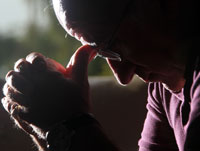
There need to be more mental health services for people on the edge of crisis care, according to the charity Mind’s year-long investigation into the state of acute and crisis care services for people with urgent mental health needs.
Many service users told Mind they were frustrated by the focus on thresholds, with one saying: “It feels like I literally have to have one foot off the bridge before I can access services.”
Others talked about being “batted away” or “deflected” from services when practitioners did not believe they were at a crisis stage. One of Mind’s recommendations for commissioners was to provide for those who do not need a full statutory crisis response.
The report said primary care services and community mental health teams should consider how they support people more intensively during difficult periods rather than automatically referring them to crisis resolution and home treatment teams. There could also be a role for the third sector in this effort, the report added.
A recurrent theme throughout the investigation was the number of beds and high occupancy rates in hospitals, which Mind said were not always accurately reflected in statistics.
One psychiatrist told the charity he had seen 10 avoidable suicides in recent years due to severely depressed people at risk of suicide being denied hospital admission due to lack of beds and current policies.
The quality of life in hospital was flagged as an issue as well, with problems including “overcrowding, uncleanliness, being denied access to outside space, bad food and nothing to do”, the report said.
“One person commented on being cut off from family and friends, with only one phone call allowed per day,” the report continued. “Many people felt that not enough was done to help them recover, including wanting talking therapies or counselling, and not being able to get them. There was a lack of security for belongings, where people’s property was taken or repeatedly moved.”
Mind said mental health providers needed to think of people using hospital and other building-based services as “guests” as well as recipients of care, investing in the care and working environments as needed. The report also called for the elimination of mixed sex accommodation and the prioritisation of safety and privacy for service users.
What do you think? Join the debate on CareSpace
Keep up to date with the latest developments in social care. Sign up to our daily and weekly emails
Related articles:


 Assistive technology and dementia: practice tips
Assistive technology and dementia: practice tips  A trauma-informed approach to social work: practice tips
A trauma-informed approach to social work: practice tips 




 Find out how to develop your emotional resilience with our free downloadable guide
Find out how to develop your emotional resilience with our free downloadable guide  Develop your social work career with Community Care’s Careers and Training Guide
Develop your social work career with Community Care’s Careers and Training Guide  ‘Dear Sajid Javid: please end the inappropriate detention of autistic people and those with learning disabilities’
‘Dear Sajid Javid: please end the inappropriate detention of autistic people and those with learning disabilities’ Ofsted calls for power to scrutinise children’s home groups
Ofsted calls for power to scrutinise children’s home groups Seven in eight commissioners paying below ‘minimum rate for home care’
Seven in eight commissioners paying below ‘minimum rate for home care’
 Facebook
Facebook X
X LinkedIn
LinkedIn Instagram
Instagram
Comments are closed.